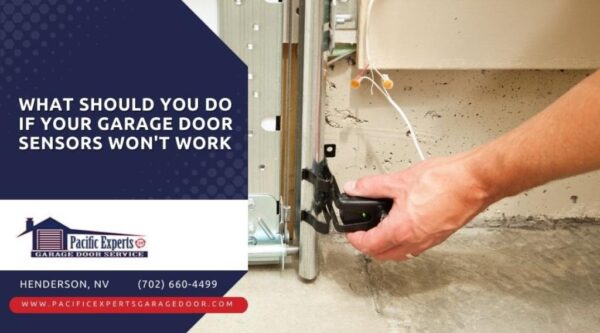Garage doors are an essential part of our homes, offering convenience and security. However, these mechanical marvels rely on advanced technology to operate safely. One crucial component of this technology is the garage door sensor. When your garage door sensors refuse to cooperate, it can be frustrating and even pose risks. In this comprehensive guide, we'll delve into the world of garage door sensors, exploring their function, common issues that can arise, potential reasons behind these problems, effective troubleshooting steps, the importance of emergency garage door repairs, and more. By the end, you'll be armed with the knowledge to tackle garage door sensor issues head-on.
- What are Garage Door Sensors?
- How Do Garage Door Sensors Work?
- Common Garage Door Sensor Problems
- Garage Door Sensors Not Working Entirely
- No Lights on Garage Door Sensors
- Damaged Wiring
- Dirty or Obstructed Sensors
- Misalignment
- Blocked Sensor Path
- Weak Batteries
- Common Reasons a Garage Door Sensor Stops Working
- Improper Installation
- Power Issues
- Physical Damage
- Electronic Interference
- Sunlight Interference
- Faulty Wiring
- Batteries Need Replacement
- Ways to Fix Garage Door Sensors
- Check Sensor Alignment
- Clean the Sensors
- Check the Wiring
- Test the LEDs
- Remove Obstruction
- Check Power Supply
- Reset the Sensors
- Garage Door Sensor Replacement
- Why Are My Garage Door Sensors Not Lighting Up
- Hiring Emergency Garage Door Repairs
- Complex Electrical Work
- Safety Concerns
- Timely Solutions
- Comprehensive Diagnoses
- Warranty and Quality Assurance
- Secure Your Home with Reliable Garage Door Sensors
- Frequently Asked Questions
- Can I install garage door sensors myself?
- Why are my sensor lights blinking?
- Are sunlight interference issues common?
- How often should I test my garage door sensors?
- Can I replace only one sensor if it's faulty?
What are Garage Door Sensors?
Before we tackle the complexities, let's start with the basics. Garage door sensors are compact yet mighty devices positioned near the base of your garage door's opening. These sensors utilize infrared technology, the same technology that brings your remote control to life, to ensure that your garage door functions safely and efficiently. Their primary purpose? To detect obstacles in the path of your closing garage door.
How Do Garage Door Sensors Work?
To truly appreciate the marvel of garage door sensors, it's important to understand how they operate. Imagine a sentinel on each side of your garage door's entrance. One sentinel emits an invisible beam of infrared light, while its counterpart stands ready to catch this beam. When this beam is broken—say, by a child's bike, a pet, or even your own feet—the sensor detects the interruption and sends a signal to the garage door opener. This signal acts as a command to halt the door's movement, preventing any accidents or damage. It's a finely tuned dance of technology that prioritizes safety above all else.
Common Garage Door Sensor Problems
When it comes to the seamless operation of your garage door, the role of sensors cannot be overstated. These unassuming yet highly sophisticated devices play a critical role in ensuring your garage door's safe functioning. However, like any technology, garage door sensors can encounter issues that demand attention. From unresponsive sensors to indicator lights that remain dim, a range of problems can arise, causing inconvenience and potential safety hazards. Let's dive into the common issues you might encounter with your garage door sensors:
Garage Door Sensors Not Working Entirely
When your garage door sensors refuse to cooperate entirely, it's more than a minor inconvenience. This issue could stem from various sources, ranging from wiring problems to sensor misalignment. The sensors serve as the vigilant guardians of your garage's safety, and their inactivity demands immediate attention.
No Lights on Garage Door Sensors
The absence of those reassuring indicator lights can leave you puzzled and concerned. These lights serve as a visual confirmation that your garage door sensors are in good working order. If they remain dormant, it's time to embark on a troubleshooting journey. The cause could be a power-related hiccup, a wiring glitch, or even a deeper electronic malfunction. Investigating the lack of lights is a step toward restoring the sensors' full functionality.
Damaged Wiring
Your garage door sensors might be hardworking, but they're not immune to wear and tear. Over time, the wiring that connects them to the opener can succumb to the elements, corrosion, or accidental damage. As these wires play a crucial role in transmitting signals, any disruption can lead to sensor malfunction. Identifying and rectifying damaged wiring can be the key to bringing your sensors back to life.
Dirty or Obstructed Sensors
Life's debris, dust, cobwebs, and dirt can accumulate on your sensor lenses, impairing their ability to function accurately. These seemingly harmless elements can interrupt the infrared beam's path, causing false signals that halt the door's operation. A simple but diligent cleaning routine can often clear the sensors' vision and prevent unnecessary interruptions.
Misalignment
Perfect alignment is not just a quirk; it's a necessity for your garage door sensors. These vigilant sentinels need to "see" each other clearly to function properly. Even a slight misalignment can send misleading signals, leading to erratic behavior. Whether caused by accidental bumps or gradual shifts, realigning the sensors is a fundamental step in troubleshooting their operation.
Blocked Sensor Path
The realm around your garage door can sometimes resemble a storage area. However, leaving objects in the sensor's line of sight can confuse them into believing there's an obstruction. A forgotten shovel, a fallen box, or even clutter can lead to unnecessary halts in the door's movement. Regularly clearing the sensor path can prevent these false alarms.
Weak Batteries
If your sensors operate on battery power, don't underestimate the importance of fresh batteries. Low battery levels can compromise their ability to communicate effectively with the garage door opener. Regularly checking and replacing batteries can prevent unexpected sensor failures.
Common Reasons a Garage Door Sensor Stops Working
As a homeowner, understanding the potential reasons behind a malfunctioning garage door sensor can empower you to take informed action. These sensors might be advanced, but they are not impervious to issues. Here's a closer look at the common culprits that can lead to a non-functioning sensor:
Improper Installation
The foundation of any technology is its installation, and garage door sensors are no exception. If these devices are not installed correctly, issues like misalignment and poor communication can arise. The sensors' effectiveness hinges on their precise placement and connection.
Power Issues
Just like any electronic device, garage door sensors rely on a consistent power supply. If the power source is disrupted due to a tripped circuit breaker, a loose connection, or even a power outage, the sensors can't perform their crucial role effectively.
Physical Damage
Life is full of surprises, and unfortunately, some of these surprises involve accidental impacts with your garage door sensors. Whether it's a bicycle knocked over or a lawnmower grazing the sensors, physical damage can compromise their integrity and function.
Electronic Interference
In our interconnected world, electronic signals are everywhere. Sometimes, these signals can interfere with the sensors' ability to communicate with the garage door opener. Nearby devices or frequencies emitting electromagnetic interference can disrupt the sensor's infrared beam.
Sunlight Interference
Even the sun can play tricks on your sensors. The natural light of day, or even artificial lighting, can interfere with the sensors' infrared detection. This interference can lead to incorrect signals, causing the door to unexpectedly halt.
Faulty Wiring
Over time, wear and tear can affect the integrity of the wiring connecting the sensors to the opener. Frayed or deteriorated wiring can result in poor communication or no communication at all.
Batteries Need Replacement
If your sensors operate on batteries, outdated or weak batteries can lead to sporadic malfunctions. Checking and changing the batteries regularly ensures consistent sensor performance.
Ways to Fix Garage Door Sensors
When your garage door sensors decide to act up, addressing the issues promptly can save you time, frustration, and potentially costly repairs. Before calling in the professionals, consider these effective troubleshooting steps:
Check Sensor Alignment
Begin by examining the alignment of your sensors. These vigilant devices should be facing each other squarely, with no obstructions between them. A misaligned sensor pair can lead to inaccurate readings and disrupt the seamless operation of your garage door.
Clean the Sensors
The lenses of your sensors are their windows to the world. Over time, these lenses can accumulate dirt, dust, and debris that obstruct their view. Gently cleaning the sensor lenses with a soft cloth can restore their clarity and ensure accurate object detection.
Check the Wiring
The wiring connecting your sensors to the opener is the bridge for communication. Inspect this wiring for signs of damage, fraying, or loose connections. Addressing wiring issues promptly can prevent disruptions in the signals that allow your garage door to function safely.
Test the LEDs
If the indicator lights on your sensors are dim or nonexistent, it might indicate a problem with the LEDs themselves. Testing the LEDs can help you determine if they are functioning as they should. Replacing faulty LEDs can often resolve lighting issues.
Remove Obstruction
Sometimes, the solution is as simple as removing obstacles from the sensor's path. Objects, even small ones, can trigger false readings and halt the garage door's operation. Ensuring a clear path for the sensors can prevent unnecessary interruptions.
Check Power Supply
The sensors' power supply is a critical factor in their performance. Confirm that they are receiving the required power by checking for loose connections or tripped circuit breakers. Addressing power-related issues can swiftly restore proper sensor functionality.
Reset the Sensors
Occasionally, sensors can experience minor glitches that impact their operation. Consult your sensor's manual for instructions on how to reset them. A reset can clear these minor issues and restore the sensors' proper functioning.
Garage Door Sensor Replacement
If all your troubleshooting efforts prove unsuccessful, it might be time to consider sensor replacement. Replacing garage door sensors can bring a fresh start to your garage door's safety and functionality.
Why Are My Garage Door Sensors Not Lighting Up
The illumination of your garage door sensors' indicator lights is a vital aspect of their functionality. When these lights are not shining as they should, it's a clear sign that something is awry. Here are the potential reasons behind this perplexing issue:
- Power Supply Problems
- Burned-out LEDs
- Electronic Malfunctions
- Sensor Alignment
- Faulty Wiring
Hiring Emergency Garage Door Repairs
While DIY fixes can be satisfying and cost-effective, there are instances when the expertise of professionals is not just recommended but necessary. Here's why seeking emergency garage door repairs can be a smart move:
Complex Electrical Work
Garage door sensors, with their intricate wiring and electronic components, can pose a challenge to those without technical expertise. If the issue seems to be deeply rooted in the sensor's internal electronics or wiring, it's best to leave the work to professionals who understand the complexities involved.
Safety Concerns
Garage doors are heavy and powerful. Attempting repairs without the right knowledge and tools can lead to accidents and injuries. Professionals are well-versed in safety protocols and can ensure that the repair process is carried out without putting anyone at risk.
Timely Solutions
Emergency garage door repair services are equipped to address issues promptly. If your garage door sensor problems are affecting your daily routine or leaving your property vulnerable, professionals can provide timely solutions to restore normalcy and security.
Comprehensive Diagnoses
Sometimes, what appears to be a sensor issue might have underlying causes that aren't immediately obvious. Professionals can perform comprehensive diagnostics to identify the root cause of the problem and address it effectively, preventing recurring issues.
Warranty and Quality Assurance
Reputable garage door repair services often provide warranties on their work. This gives you peace of mind knowing that if the issue resurfaces within a specified period, you'll receive support without additional costs. Additionally, professionals ensure quality repairs that can extend the lifespan of your garage door system.
Secure Your Home with Reliable Garage Door Sensors
Garage door sensors might be small devices, but they carry enormous responsibility. They keep our loved ones safe and our property secure. By understanding their function, potential problems, and steps for resolution, you're ensuring that your garage door operates seamlessly and without hazards. Regular maintenance, quick troubleshooting, and the wisdom to seek professional assistance when needed are your best allies in the realm of garage door sensors.
When you need a 24 hour emergency garage door repair Las Vegas service, Pacific Experts Garage Door Repair stands out as a trusted name. With a reputation for excellence and a commitment to customer safety, we offer top-notch sensor repair and installation services. Our team of experts ensures that the sensors are properly installed and calibrated, maximizing their effectiveness in safeguarding your home. Call us now at (702) 727-1152.
Frequently Asked Questions
Can I install garage door sensors myself?
Yes, you can install them yourself, but proper alignment and installation are crucial for their effectiveness.
Why are my sensor lights blinking?
Blinking lights could indicate misalignment or a blocked sensor path. Check for obstacles and adjust the alignment if needed.
Are sunlight interference issues common?
Yes, direct sunlight or glare can occasionally affect sensor performance. Consider shading the sensors or adjusting their angle.
How often should I test my garage door sensors?
It's recommended to test them at least once a month to ensure they're functioning correctly.
Can I replace only one sensor if it's faulty?
While you can replace a single sensor, it's advisable to replace both to maintain proper compatibility and performance.



